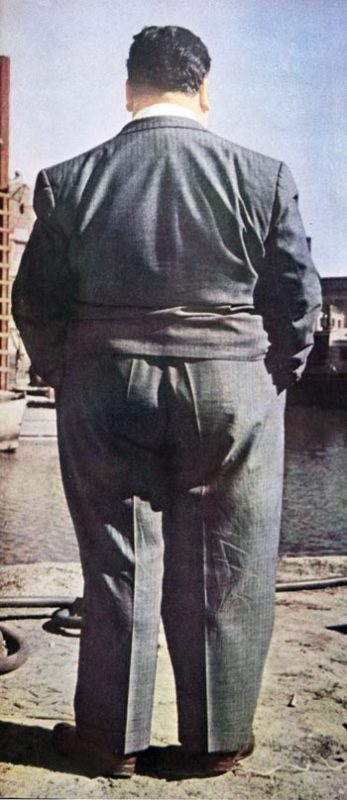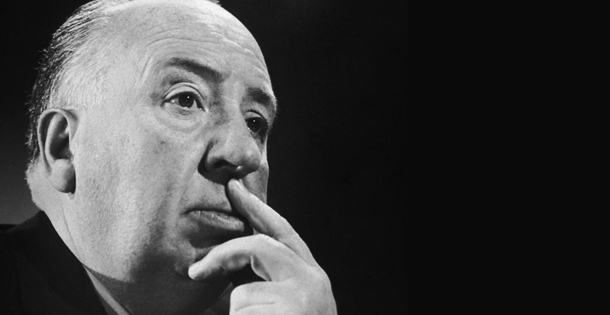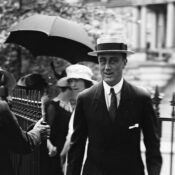
Originally published December 15, 1962
Probably the most distinctive thing about Hitchcock is that in an industry noted for executives who gingerly avoid criticizing anything or anybody, he spews a constant stream of delightful Cockney-accented vituperation. Following, listed by subject, are some examples of Hitchcockian curmudgeonry which he expressed to me:
Disney, Walt: “I used to envy him when he made only cartoons. If he didn’t like an actor, he could tear him up.”
Television, Commercials On: “Most are deadly. They are perfect for my type of show.”
Fans, intellect Of: “Most of my fans are highly intelligent people per se, or they wouldn’t be watching my shows. Some, however, are idiots. One man wrote to me, after I had Janet Leigh murdered in a bathtub in Psycho, that his wife had been afraid to bathe or shower since seeing the film. He asked me for suggestions as to what he should do. I wrote back, ‘Sir, have you considered sending your wife to the dry cleaner?’”
Hitchcock, Alfred, Girth Of: “A few years ago, in Santa Rosa, California, I caught a side view of myself in a store window and screamed with fright. Since then I limit myself to a three-course dinner of appetizer, fish, and meat, with only one bottle of vintage wine with each course.”
Actors, Childlike Qualities Of: “There is no question that all actors are children. Some are good children; some are bad children; many are stupid children. Because of this childlike quality, actors and actresses should never get married. An actress, for example, attains the blissful state of matrimony and almost immediately goes to work in a picture with a new leading man. She plays a love scene with him so passionately that after three weeks on the picture she comes home to her husband and says idiotically, ‘Darling, I want a divorce.’ They are children who never mature emotionally. It’s a tragedy.”
Television, Quality Of: “The television set now is like the toaster in American homes. You press a button and the same thing pops up almost every time.”
Star System, Absurdity of: “The movie star is no longer important. The picture is. If you check, you realize that in recent years the biggest stars, like Audrey Hepburn and Marlon Brando, have disappointing records at the box office. The star is no better than the story. In the right picture the star will be as big as ever; put him in the wrong picture and you’re no better off than if you used an unknown. There is a perfect analogy in public affairs. Right after World War II, who could have conceived that the great Churchill — the biggest star on the world stage — could be thrown out of office and rejected by the very people he had saved from disaster? What happened? The big star was in the wrong picture. The script called for a domestic-problems hero instead of a war-problems hero.”
Novak, Kim: “With a girl like Kim Novak you sometimes delude yourself into thinking you are getting a performance. Actually she is just an adequacy. The only reason I used her in Vertigo was that Vera Miles became pregnant.”
Such barbed utterances, in addition to his impudent gargoyle face seen on TV each week, have become two of Hitchcock’s trademarks in the entertainment world. He has others, as well. There is, for example, the Hitchcock practical joke, and, like everything else he says or does, the joke frequently is a sly answer to something that Alfred Hitchcock resents. Not long ago he became incensed over the Hollywood party at which the seating arrangement was as excruciatingly important as that of a diplomatic affair. So Hitchcock threw his own lawn party, complete with delicacies and red-coated waiters from Chasen’s Restaurant. Forty people showed up, but when it came time to sit down for dinner, all the place cards had phony names on them and no one knew where he was supposed to be. Jimmy Stewart’s wife said to him, “My Lord, we haven’t been invited,” and they left. Everyone else shuffled about in embarrassment until Hitch got up and told them it was a gag. They all then sat down at the nearest place, catch-as-catch-can, and we had a wonderful dinner. But Hitch, as usual, had made his point.
Hitchcock’s own training during the golden age of the silent films was as suspenseful and as harrowing as his own pictures, but, as he says, “I learned. There is no mill like this anymore.” He went on to make such classic British thrillers as The 39 Steps and The Lady Vanishes, and then, after being summoned to Hollywood in 1938, he continued to add to his reputation as the master of suspense with Rebecca, Spellbound, Notorious, Rear Window, etc. Today, with his movies, his TV show, and his Alfred Hitchcock mystery books and magazines, he nets close to $1 million a year. He has long since become an American citizen, a designation of which he is extremely proud, and which, he says, “gives me the constitutional right to comment acidly on all the ludicrousness around me.”
Not long ago, in the glow of conviviality engendered by a round of magnificent dinners with Hitchcock in his favorite San Francisco and Los Angeles restaurants, I screwed up my courage sufficiently to ask him to comment acidly about himself, as he had about so many others. He thought for a moment and said, “You know, despite all my bluster and bravado, I’m really quite sensitive and cowardly about many things. You’d never believe it, but I’m terrified of policemen and entanglements with the law, even though I make my living from dramatizing such situations. That’s why I haven’t been able to drive a car since I migrated to the United States. Even the thought of getting a traffic ticket throws me into a panic. Another thing I’m afraid of is going to see any of my pictures with an audience present. I only tried that once, with To Catch a Thief, and I was a wreck. I’m scared of seeing the mistakes I might have made.”
Then, as I took the master of the macabre home (I drove — he has his fear of police entanglements), he concluded with a Hitchcock parable: “I guess I’m like the murderer who is taken to the gallows, and he looks at the trap and says, in alarm, ‘Is that thing safe?’”
—“Alfred Hitchcock Resents”
by Bill Davidson, December 15, 1962
Become a Saturday Evening Post member and enjoy unlimited access. Subscribe now



